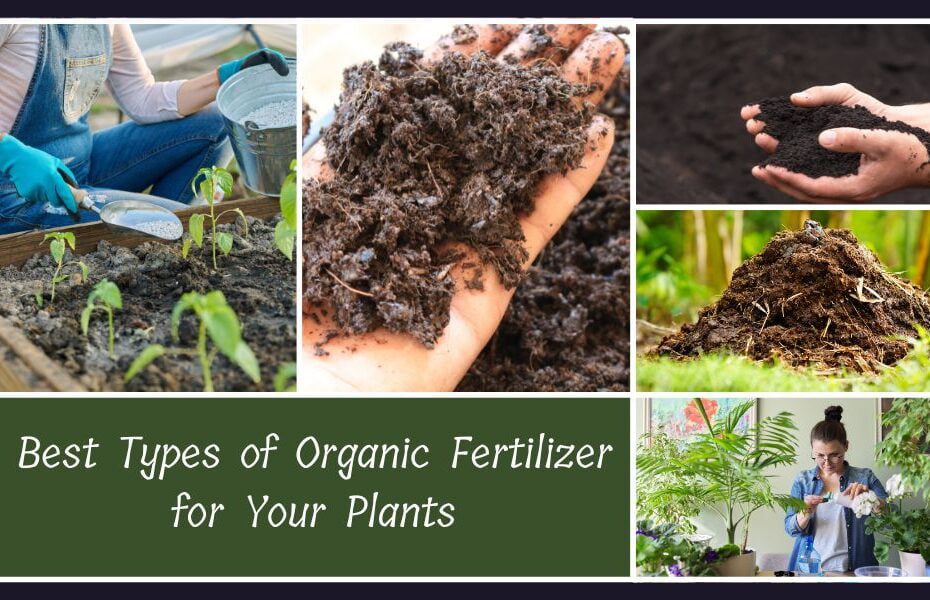In the world of indoor gardening, maintaining the health and vitality of houseplants is a top priority. While adequate water and sunlight are essential, providing proper nutrients is equally crucial. Organic fertilizers offer a natural and sustainable solution to nourish your indoor greenery without harmful chemicals. Let’s explore the various types of organic fertilizers, their uses, and the benefits that can help your houseplants thrive.
Understanding Organic Fertilizers
Organic fertilizers are derived from natural sources such as plants, animals, and minerals. Unlike synthetic fertilizers, organic options are environmentally friendly, promote soil health, and encourage microbial activity. These fertilizers release nutrients slowly, providing a steady supply to plants over time.
(Also Read: Vegetable Seeds Sowing or Planting Chart / Calendar….)
Best Types of Organic Fertilizer for Houseplants
Organic manure or fertilizers for plants come in various forms, each offering unique benefits. Here are some common types of organic fertilizers:
1. Compost

Compost is a nutrient-rich soil amendment made from decomposed organic matter. It enriches the soil with essential nutrients, improves soil structure, and enhances moisture retention. Incorporating compost into the potting mix or using it as a top dressing can benefit a wide range of houseplants.
2. Manure

Animal manure, such as cow, horse, or poultry manure, is an excellent organic fertilizer rich in nitrogen, phosphorus, and potassium (NPK). However, it should be well-aged or composted to prevent burning plant roots and reduce the risk of pathogens. Dilute manure tea can also be used as a liquid fertilizer for houseplants.
(Also Read: Top 10 Plants That Love High Phosphorus…)
3. Fish Emulsion

Fish emulsion is a byproduct of fish processing, containing high levels of nitrogen, phosphorus, and trace minerals. It is available in liquid form and is easily absorbed by plant roots. Fish emulsion provides a quick nutrient boost and is particularly beneficial for flowering and fruiting houseplants.
4. Seaweed Extract

Seaweed extract is derived from various species of seaweed and contains a wide range of nutrients, including potassium, magnesium, and trace elements. It promotes plant growth, improves soil structure, and enhances resistance to environmental stress. Seaweed extract can be applied as a foliar spray or soil drench for optimal results.
(Also Read: When And How To Use Lime For Garden Plants…)
5. Bone Meal

Bone meal is a slow-release fertilizer made from ground animal bones, rich in phosphorus and calcium. It promotes root development, strengthens plant structure, and encourages blooming. Incorporating bone meal into the potting mix or applying it as a side dressing benefits flowering and fruiting houseplants.
6. Worm Castings

Worm castings, also known as vermicompost, are the nutrient-rich excrement produced by earthworms. They contain beneficial microbes, enzymes, and plant growth hormones that improve soil fertility and plant health. Worm castings can be mixed into the potting soil or brewed into a nutrient-rich tea for watering houseplants.
Conclusion
Organic fertilizers provide a natural and sustainable method to feed houseplants, promoting healthy growth and colorful blooms. You can choose from various options like compost, manure, fish emulsion, seaweed extract, bone meal, or worm castings to incorporate organic fertilizers into your indoor gardening routine. Embrace the power of nature and watch your houseplants flourish with vitality and vigor.
(Also Read: 10-Money Making Crops With Low-Investments…)
FAQs About Organic Fertilizers for House Plants

1. What are the different types of organic fertilizers available for house plants?
- There are several types of organic fertilizers suitable for house plants, including compost, manure, fish emulsion, seaweed extract, bone meal, and worm castings.
2. How do I know which organic fertilizer is best for my house plants?
- The choice of organic fertilizer depends on the specific nutrient needs of your plants and your gardening preferences. For instance, if your plants require a quick nutrient boost, fish emulsion or seaweed extract might be suitable. On the other hand, slow-release fertilizers like compost or worm castings provide long-term nourishment.
(Also Read: What are Parasitic Plants: Examples, Types and Impact On Ecosystems….)
3. Are organic fertilizers safe for indoor use?
- Yes, organic manure or fertilizers are generally safe for indoor use. They are derived from natural sources and do not contain synthetic chemicals that may harm indoor air quality. However, it’s essential to follow the application instructions to prevent over-fertilization, which can damage plant roots.
4. How often should I apply organic fertilizers to my house plants?
- The frequency of fertilizer application depends on various factors, including the type of plant, its growth stage, and the specific fertilizer used. As a general guideline, fertilize your house plants during the growing season, typically from spring to early fall. Follow the recommended application rates provided on the fertilizer packaging or adjust based on your plant’s response.
5. Can I make my own organic fertilizer at home?
- Yes, you can create homemade organic fertilizers using kitchen scraps, compost bins, or worm composting systems. Composting organic waste materials like fruit and vegetable scraps, coffee grounds, and eggshells produces nutrient-rich compost that can be used to feed your house plants. Additionally, you can brew compost tea or worm casting tea as liquid fertilizers for your indoor greenery.
6. Will organic fertilizers attract pests or cause odors indoors?
- Organic manure or fertilizers, when used appropriately, should not attract pests or cause unpleasant odors indoors. However, it’s essential to properly store and apply organic fertilizers to minimize the risk of attracting pests or producing strong odors. Avoid over-application and maintain proper ventilation in indoor gardening spaces to ensure a healthy environment for both plants and humans.
7. Can I use organic fertilizers for all types of house plants?
- Yes, organic fertilizers are suitable for a wide variety of house plants, including flowering plants, foliage plants, succulents, and herbs. However, it’s essential to consider the specific nutrient requirements and preferences of individual plant species when selecting and applying organic manure or fertilizers. Additionally, some plants may benefit from specific types of organic fertilizers more than others.
(Also Read: Parts Of A Plant And Their Functions In Hindi…)
